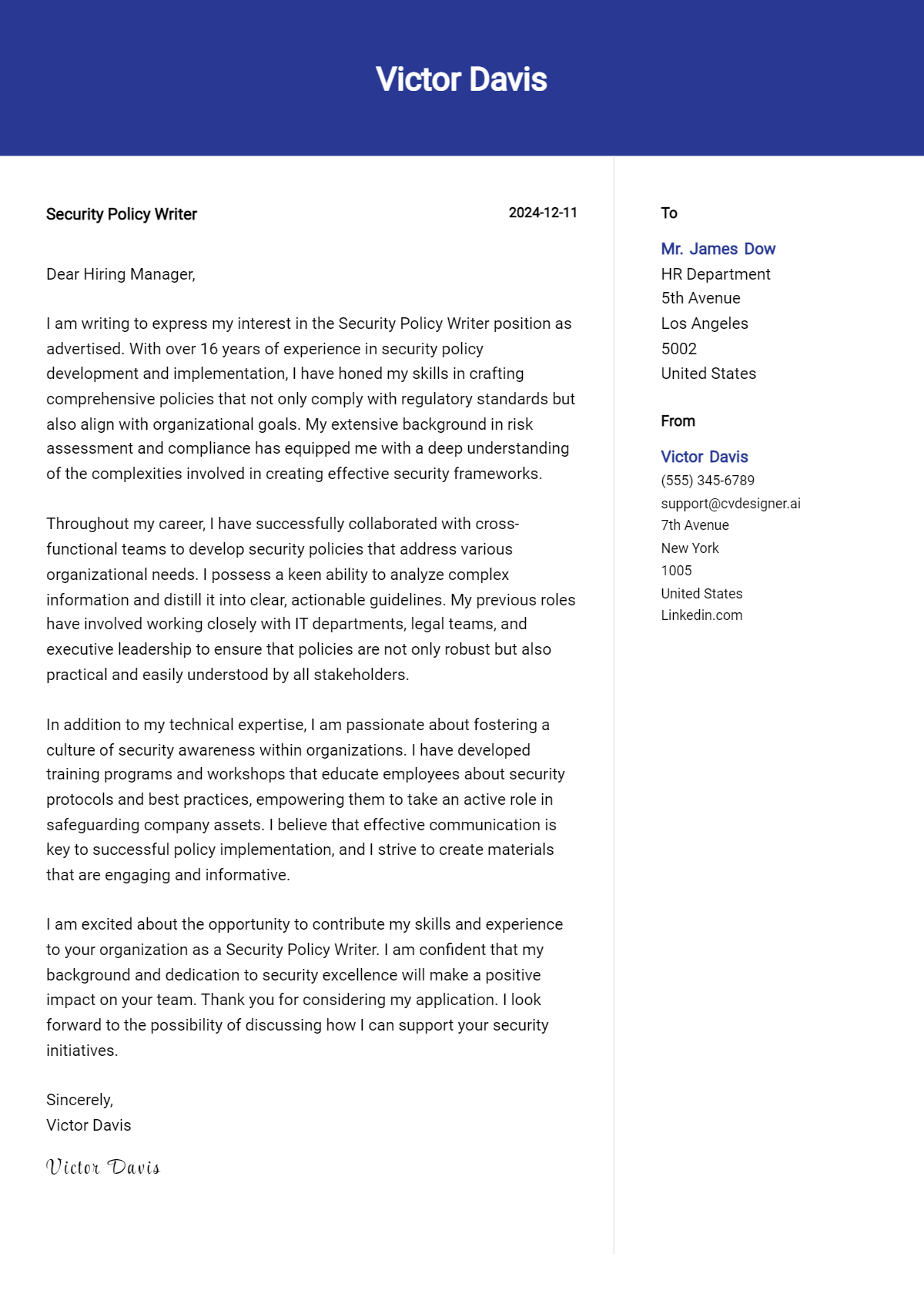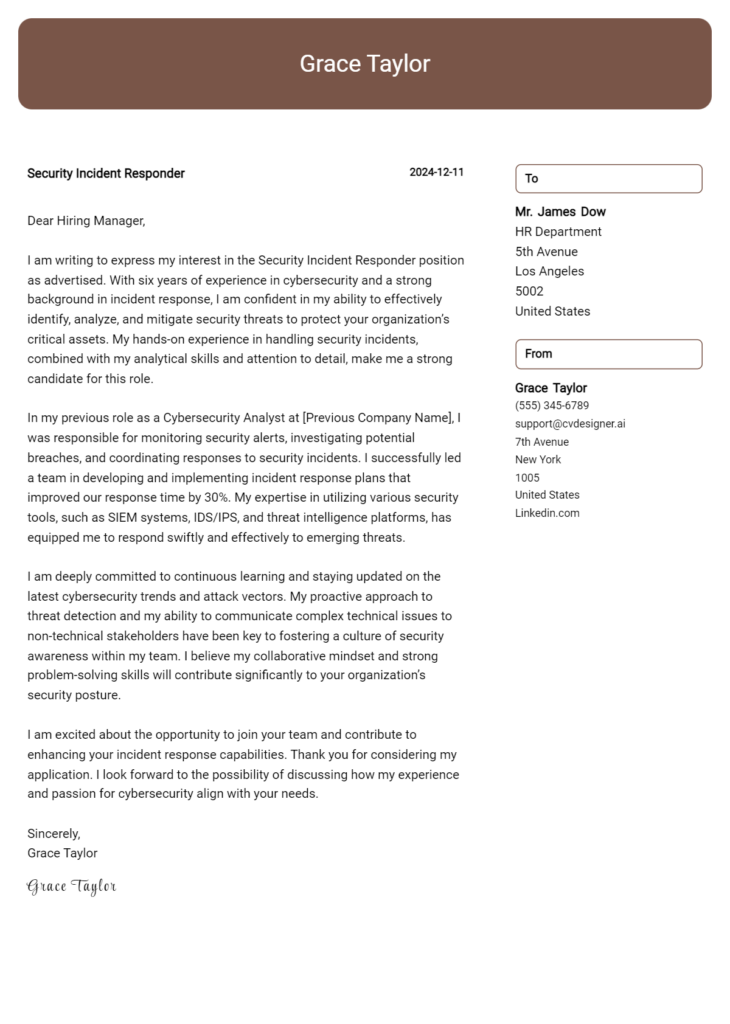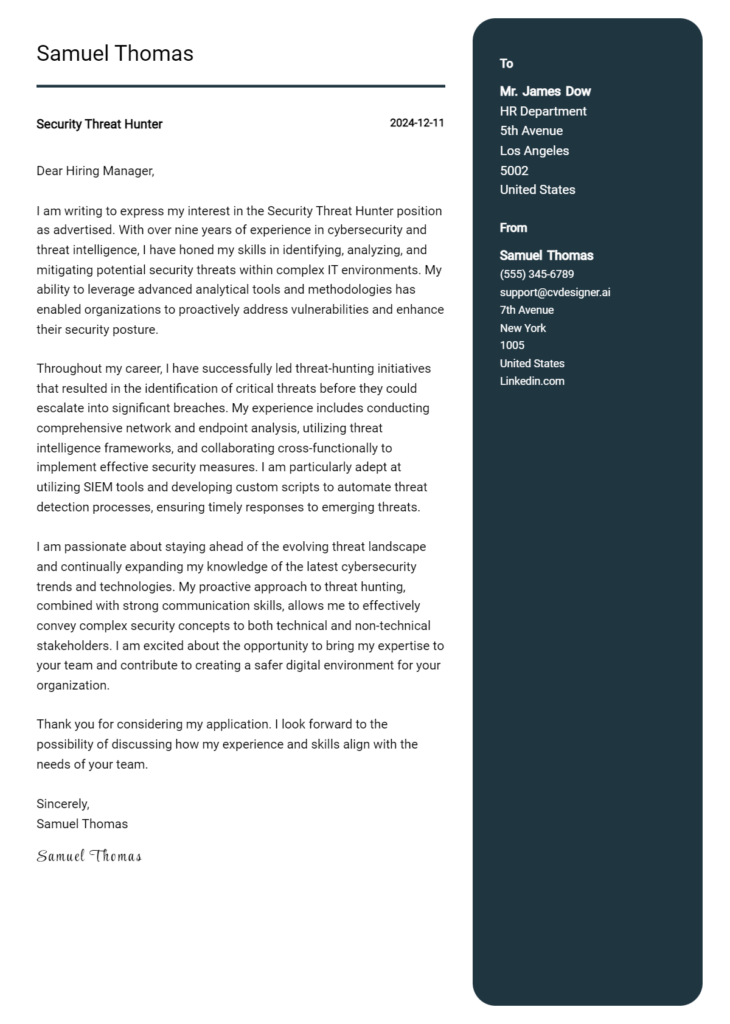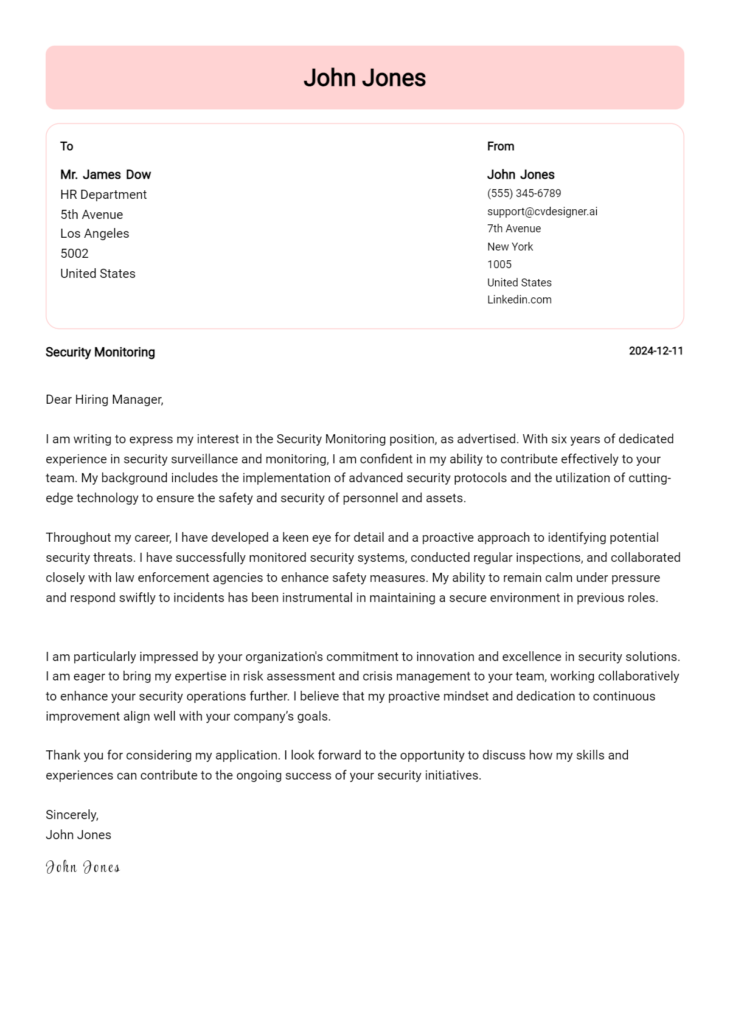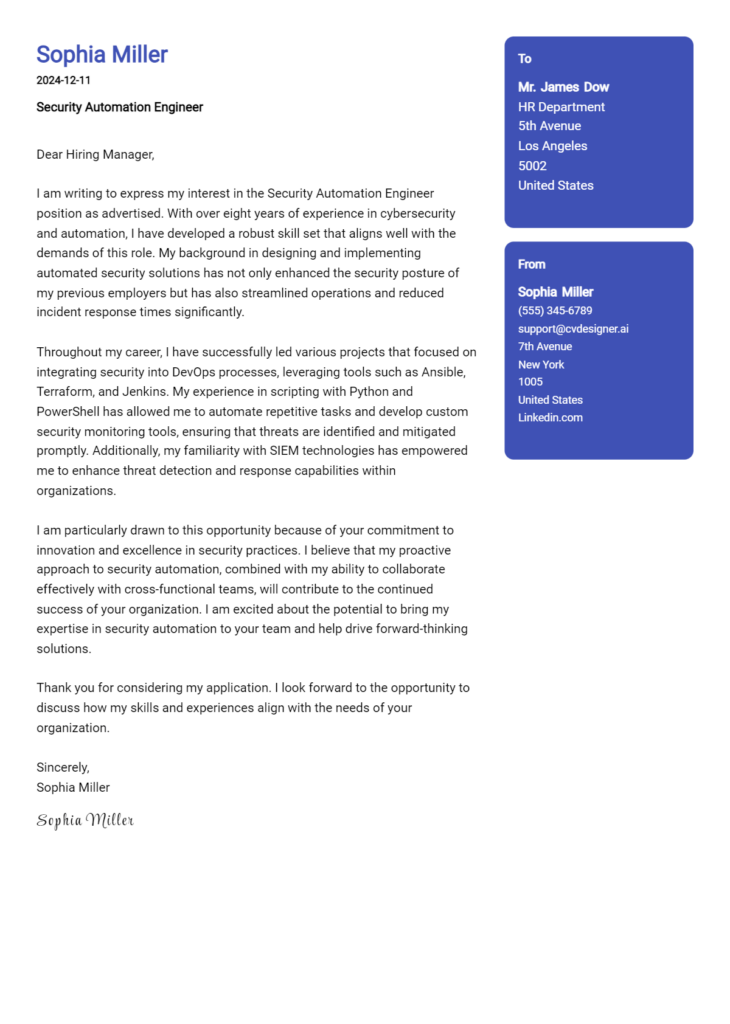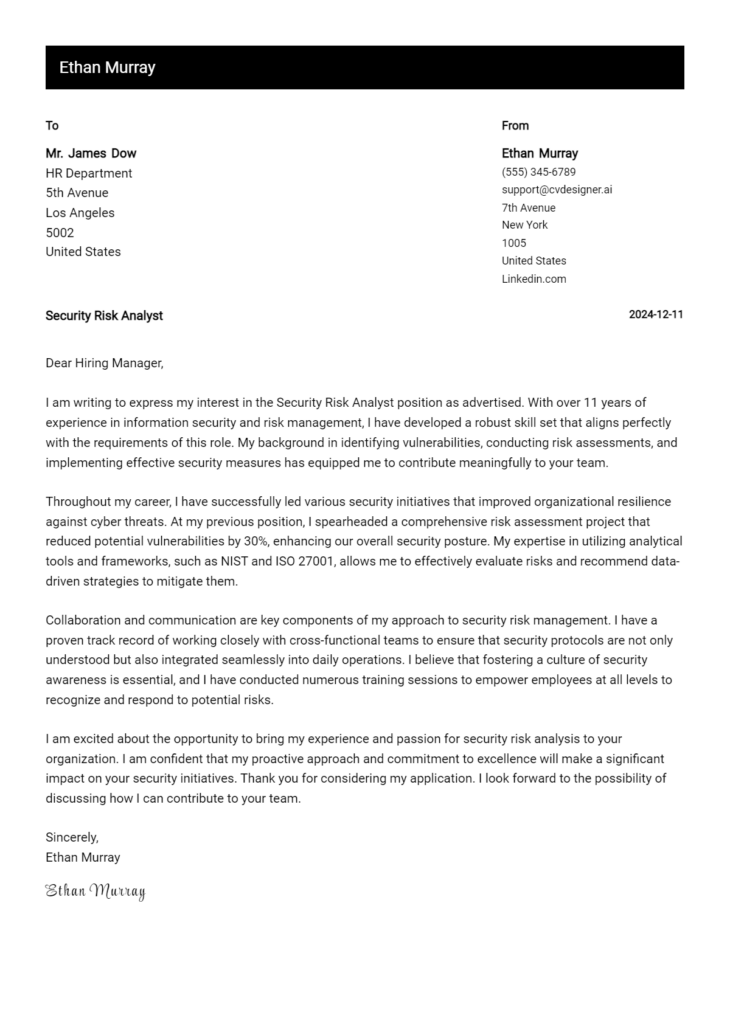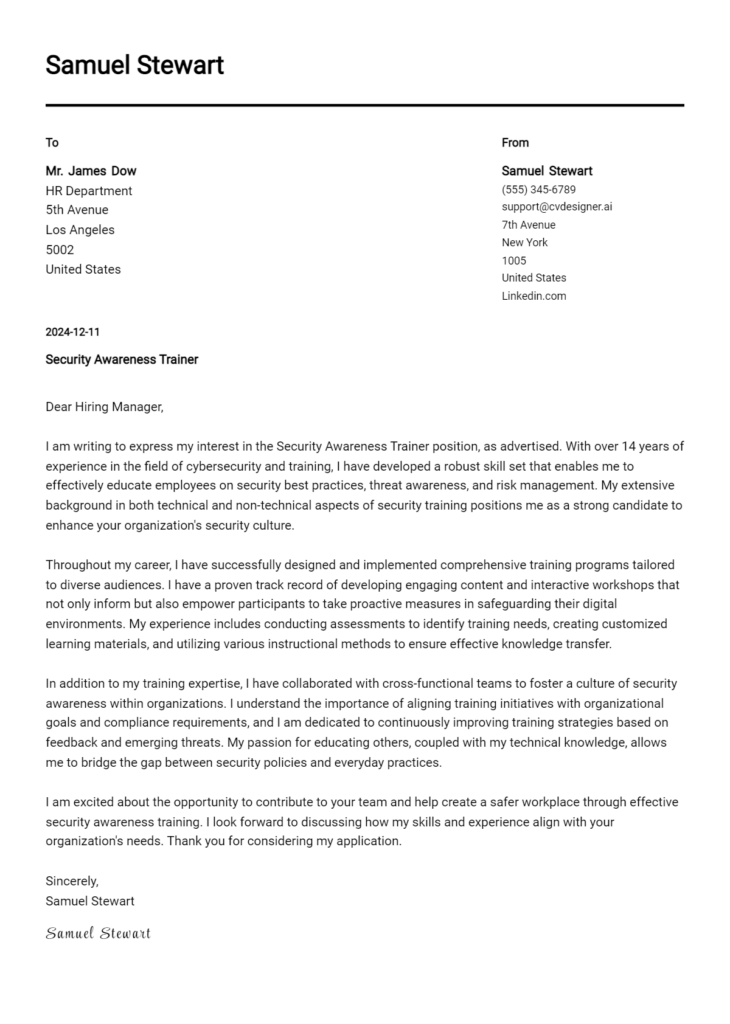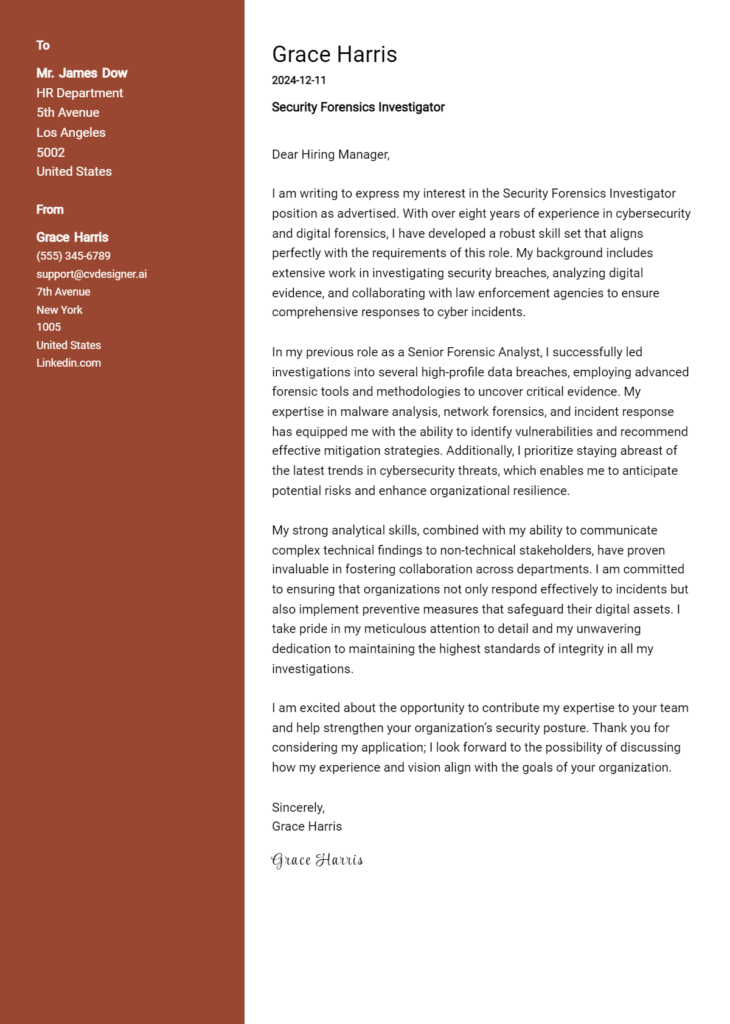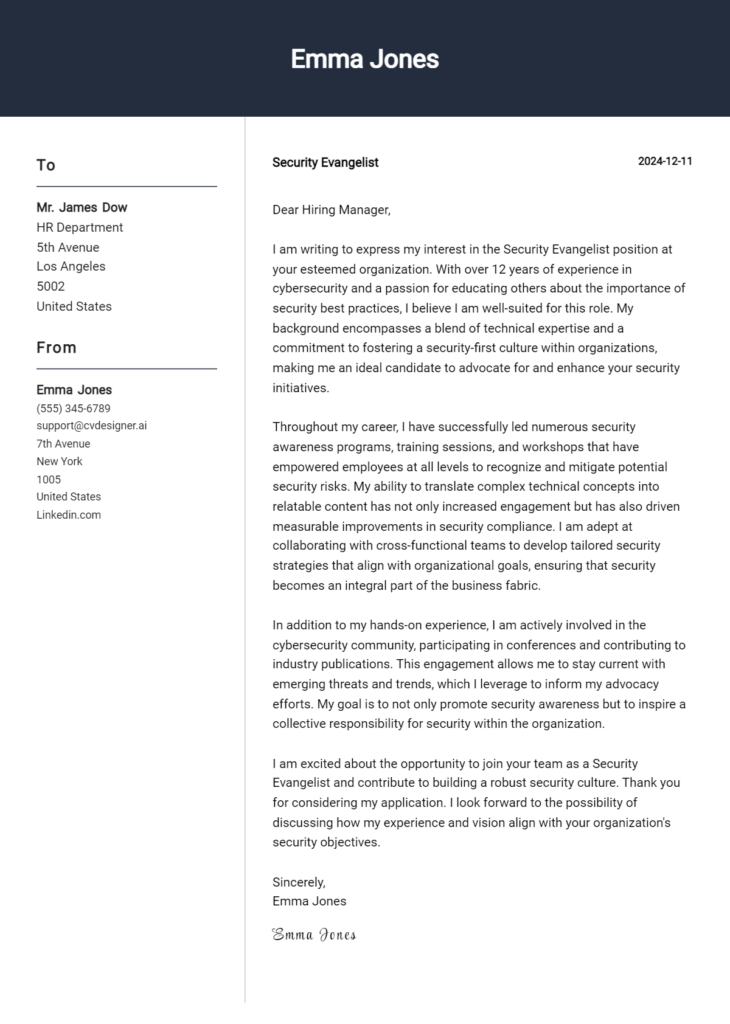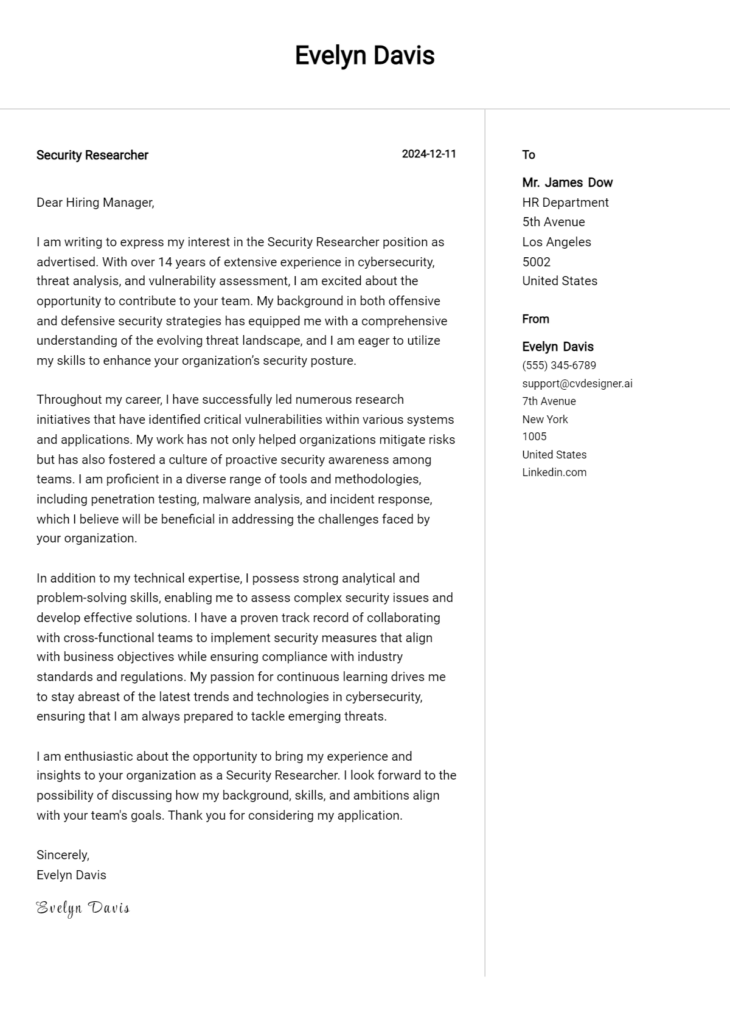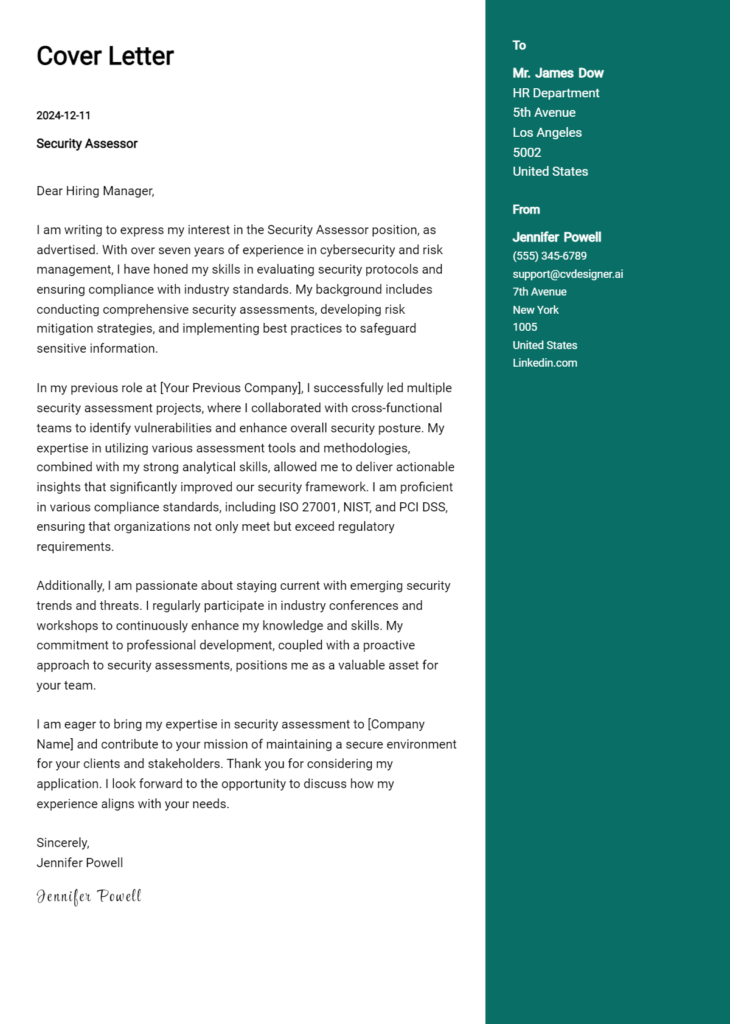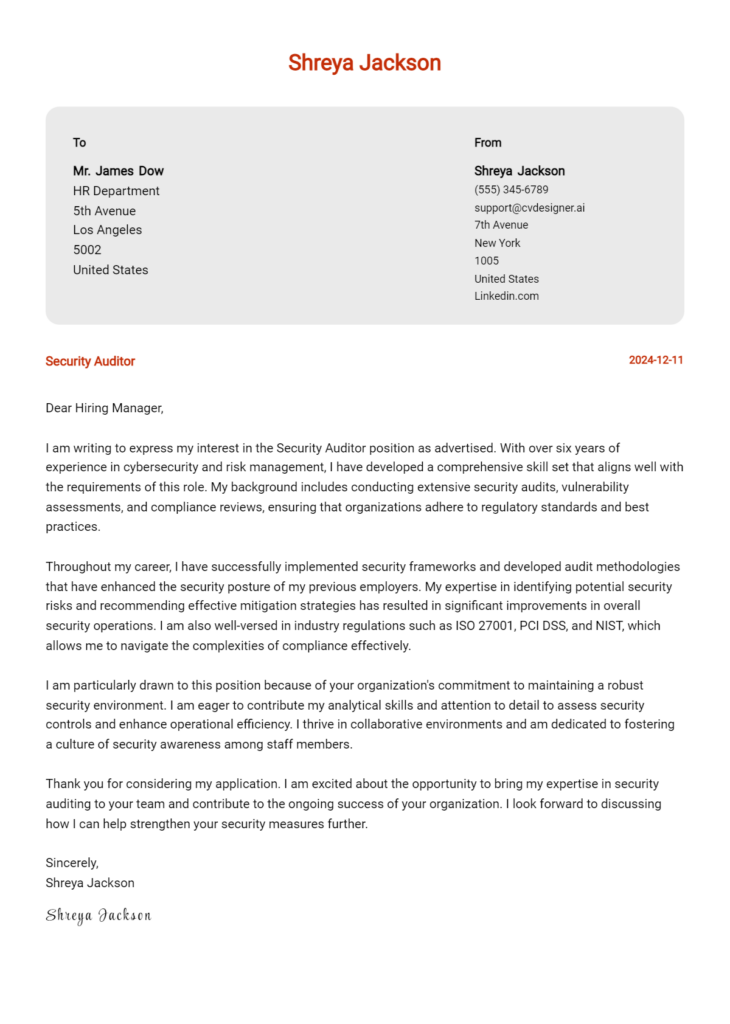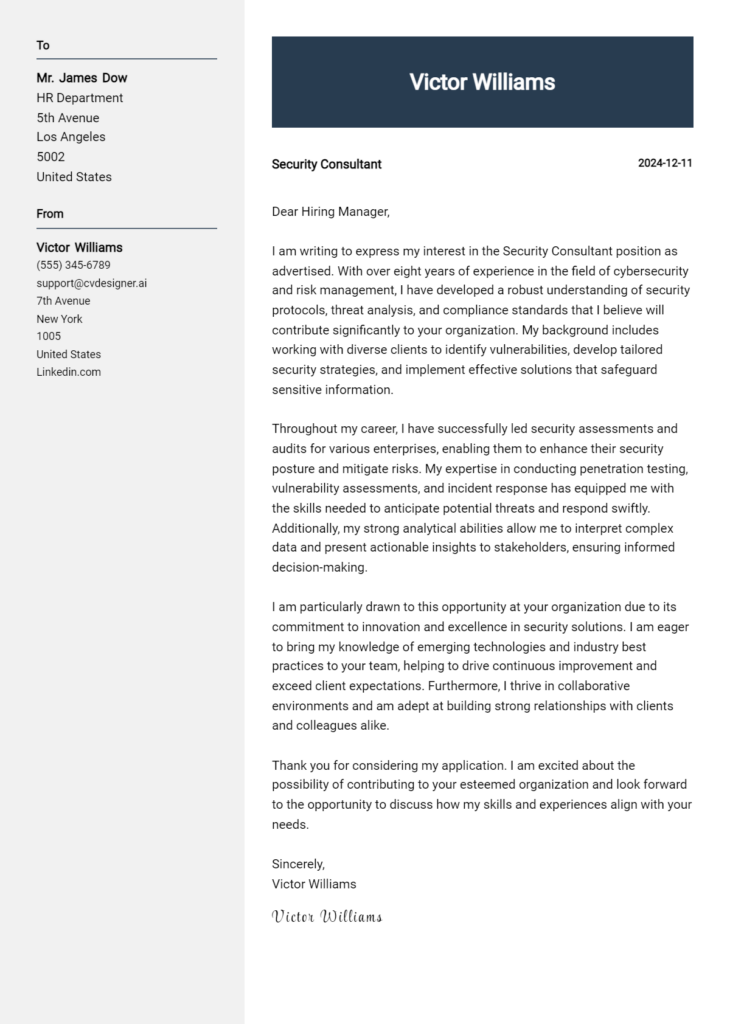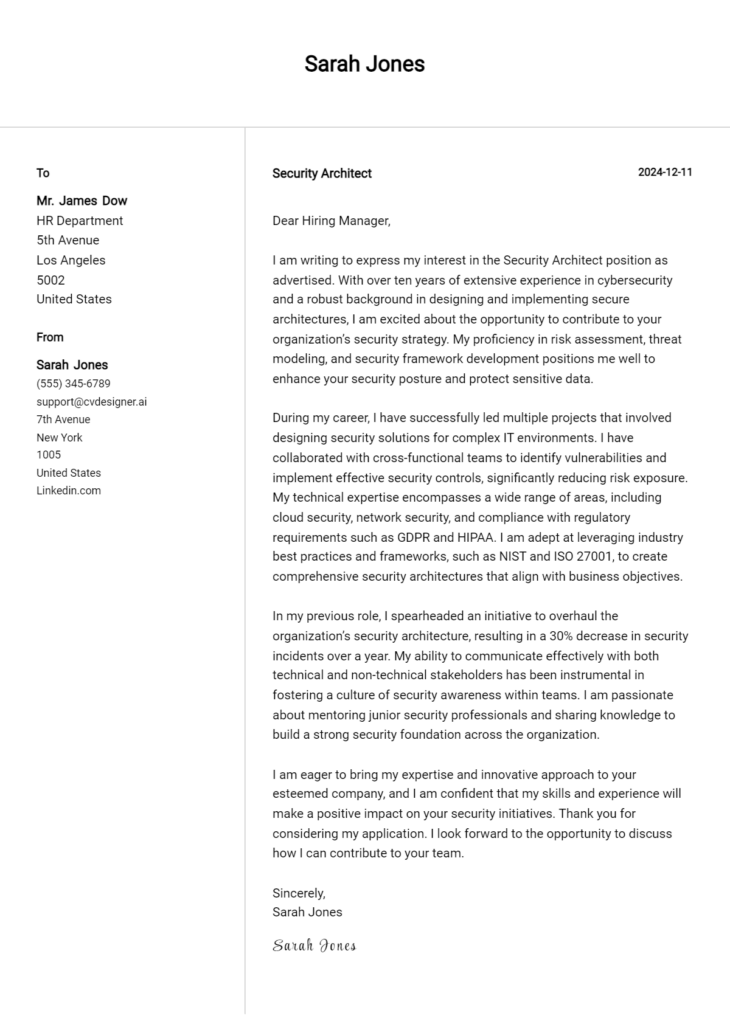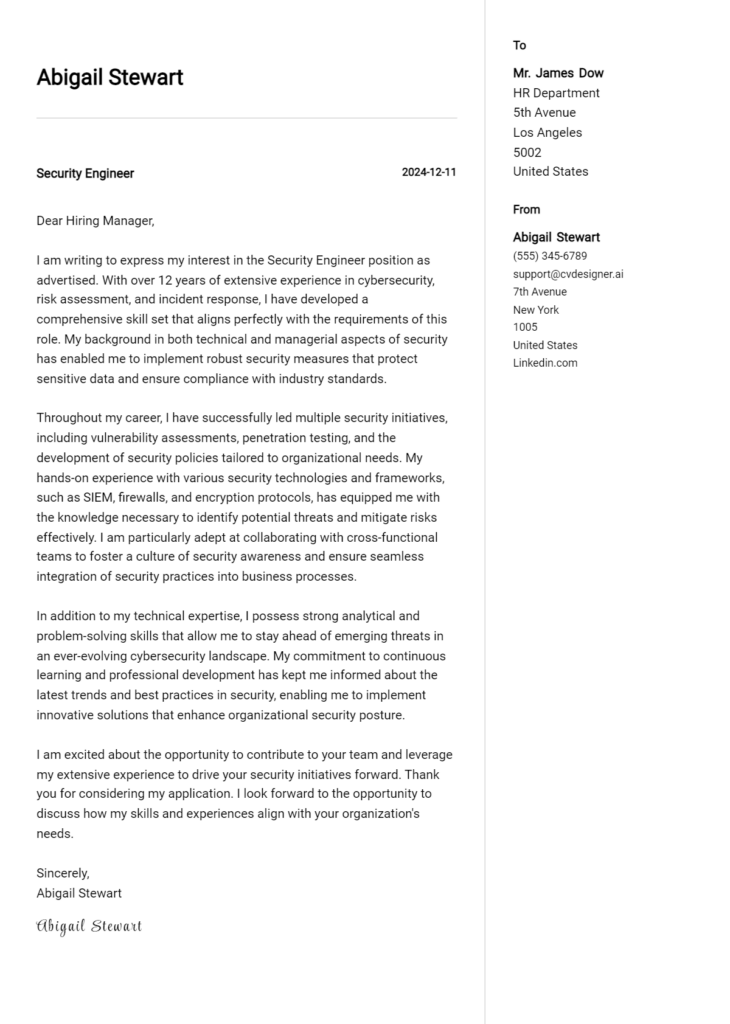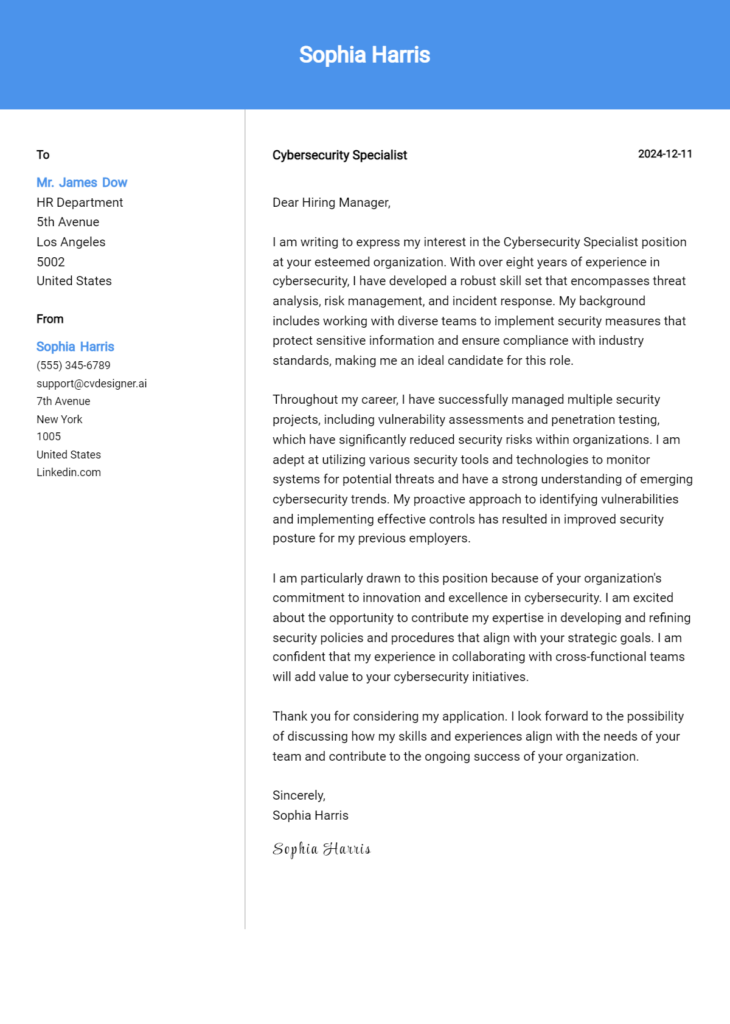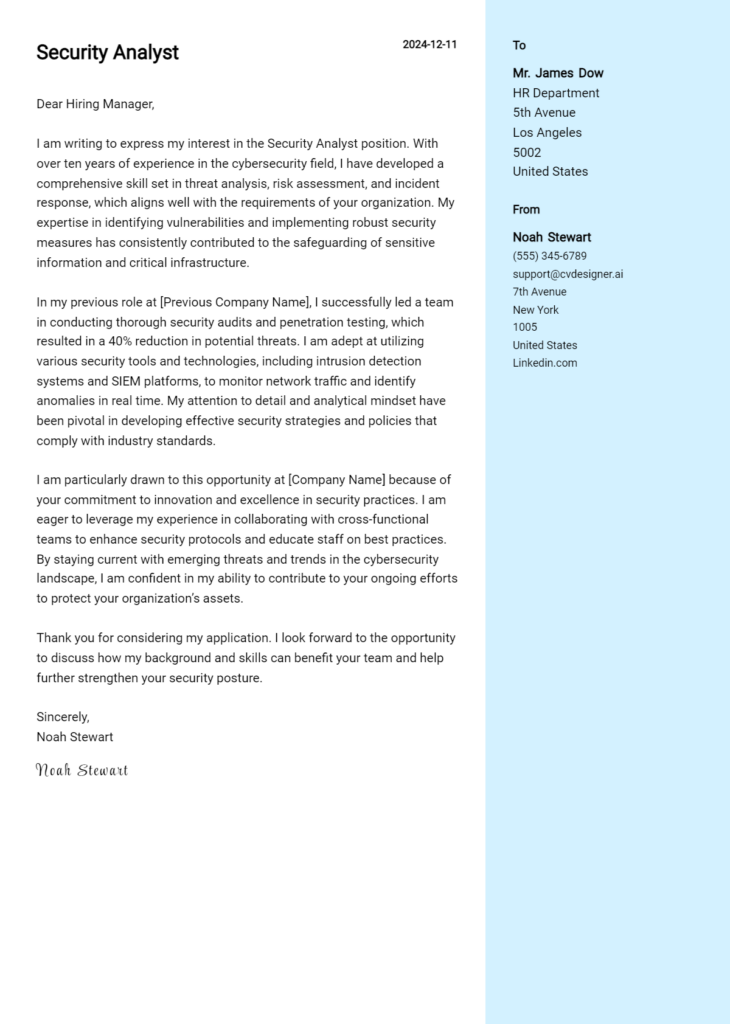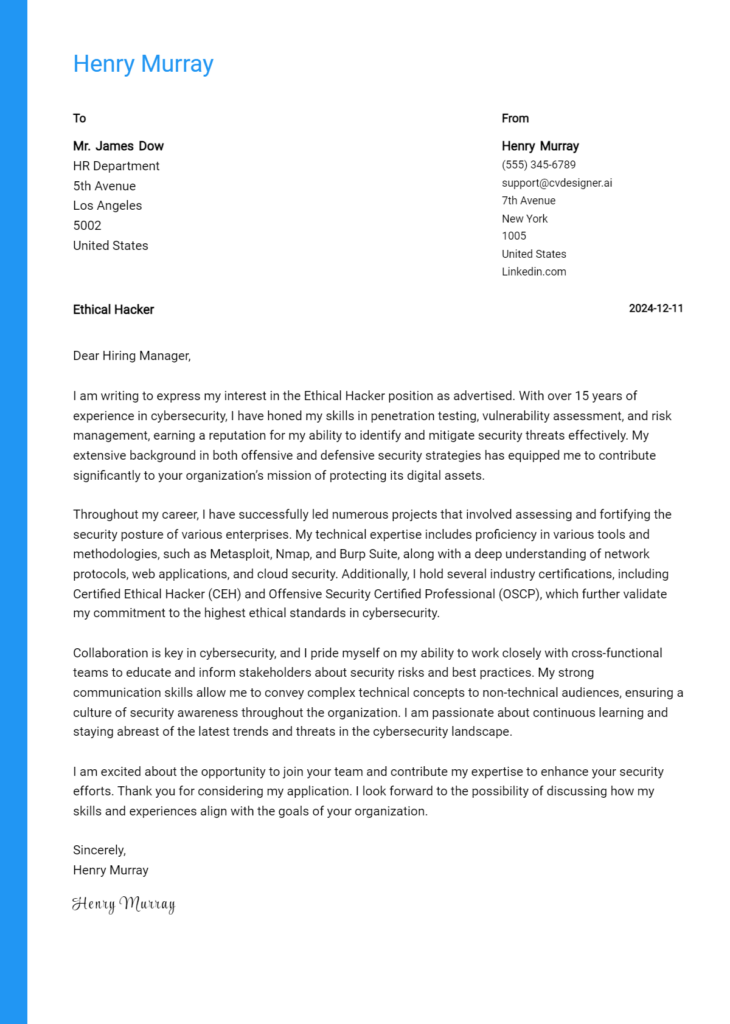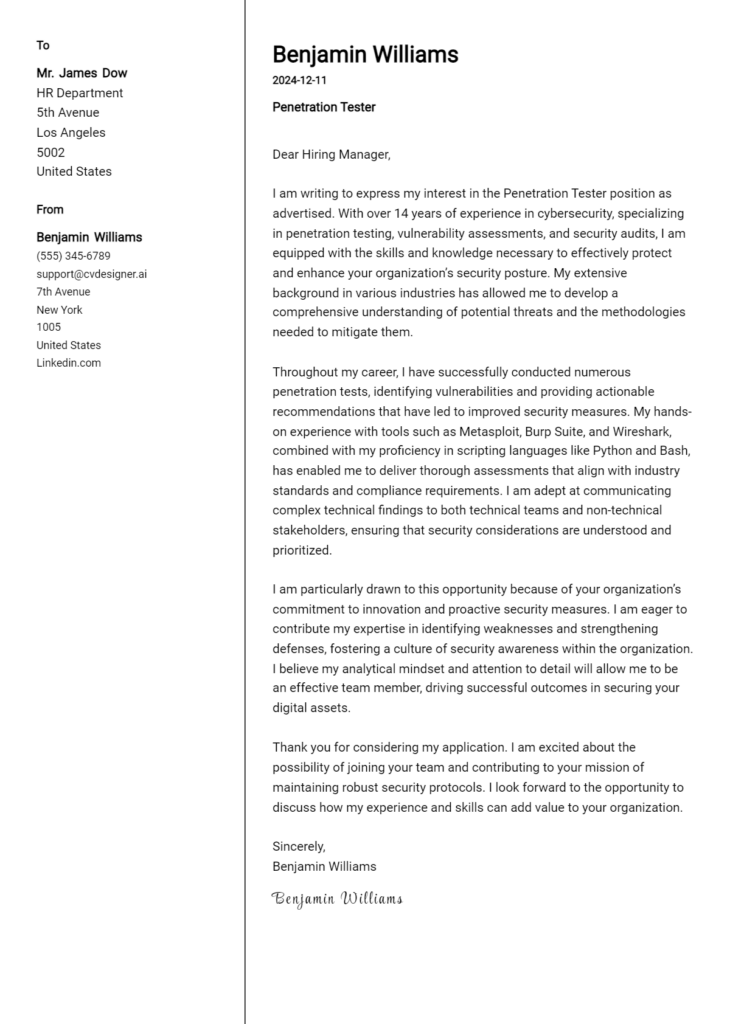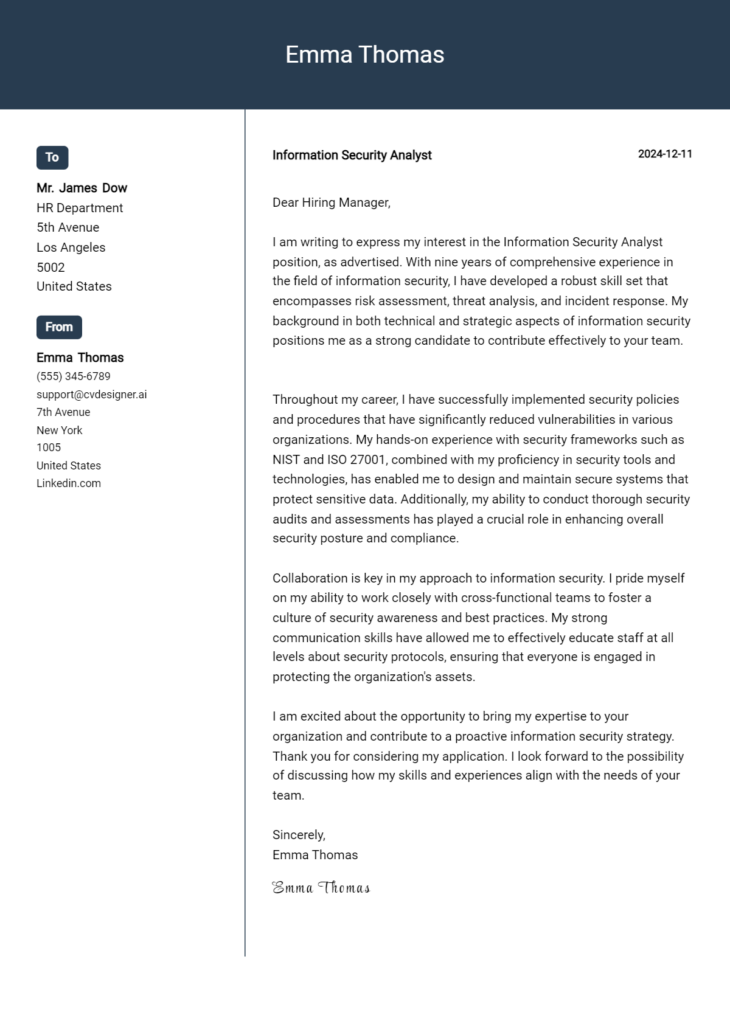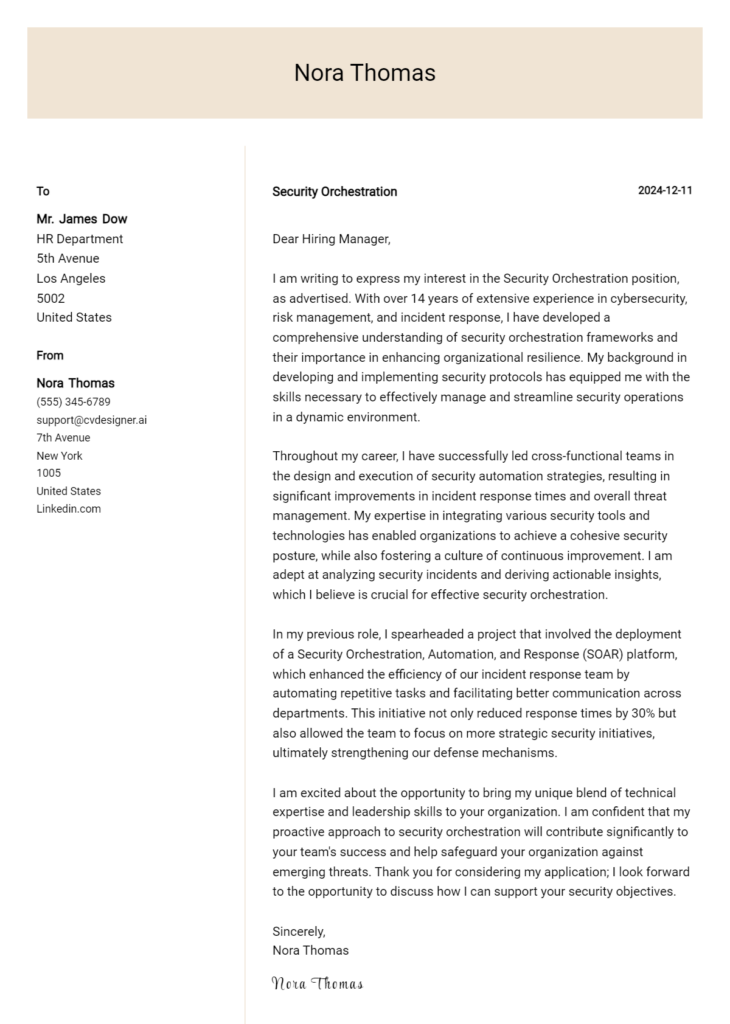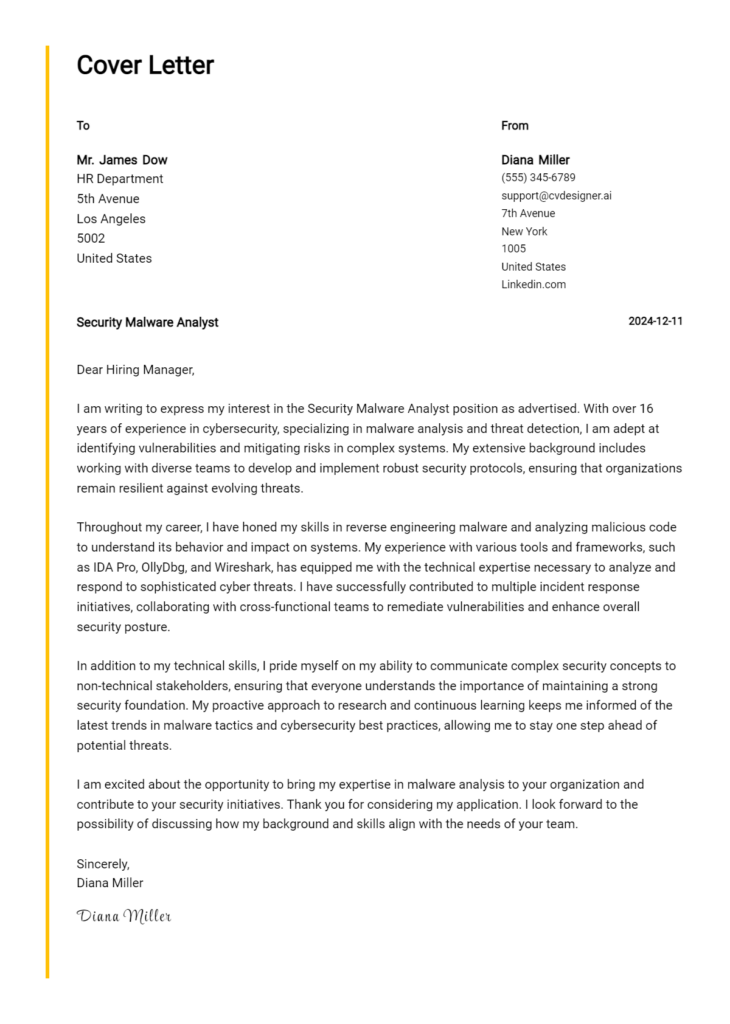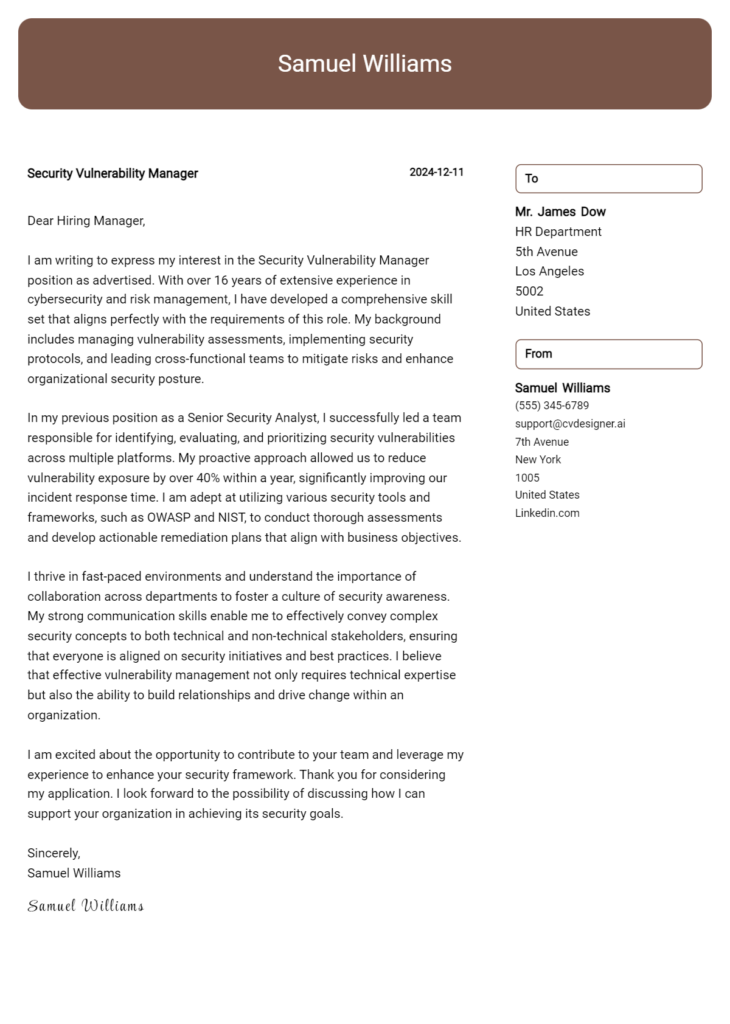Security Policy Writer Cover Letter Examples
Explore additional Security Policy Writer cover letter samples and guides and see what works for your level of experience or role.
How to Format a Security Policy Writer Cover Letter?
Crafting a compelling cover letter is essential for a Security Policy Writer, as it serves as your first opportunity to showcase your expertise in security protocols and policy formulation. The way you format your cover letter not only conveys your qualifications but also reflects your understanding of the security landscape and your ability to communicate effectively—critical skills for any policy writer. A well-structured cover letter captures the hiring manager's attention and demonstrates your professionalism, attention to detail, and commitment to security best practices.
In this guide, we'll explore how to properly format your cover letter, focusing on key components that will help you make a lasting impression.
We'll cover the essential elements of a professional cover letter, including:
- Cover Letter Header
- Cover Letter Greeting
- Cover Letter Introduction
- Cover Letter Body
- Cover Letter Closing
Each section is vital in presenting your qualifications and professionalism. Let’s delve into each part and discover how to make your Security Policy Writer cover letter shine.
Importance of the Cover Letter Header for a Security Policy Writer
A well-structured cover letter header is crucial for a Security Policy Writer as it sets the tone for professionalism and clarity right from the start. The header should include your contact information, the date, and the recipient's details, ensuring that the hiring manager can easily identify who you are and how to reach you. Clear and concise headers not only demonstrate your attention to detail but also reflect your understanding of the importance of effective communication—an essential skill in the realm of security policy writing.
A strong header conveys your professionalism and readiness for the role, while a weak header can undermine your application by giving a careless impression.
Strong Example
John Doe 123 Security Lane Cyber City, CA 90210 (123) 456-7890 johndoe@email.com October 10, 2023 Jane Smith Hiring Manager SecureTech Solutions 456 Protection Blvd Cyber City, CA 90211
Weak Example
jdoe@email.com 10/10/23 To Whom It May Concern
The Importance of a Strong Cover Letter Greeting
The greeting of a cover letter serves as the first impression and sets the tone for the rest of the document. A well-crafted greeting not only demonstrates professionalism but also shows that you have taken the time to personalize your application by addressing the hiring manager directly. This approach fosters a connection and conveys your genuine interest in the position. To make your greeting stand out, it is crucial to avoid generic salutations such as "To Whom It May Concern." Instead, invest time in researching the recipient's name and title to create a more engaging introduction. This attention to detail reflects your commitment to the role of a Security Policy Writer and can differentiate you from other candidates.
Strong Greeting Example
Dear Ms. Johnson,
Weak Greeting Example
To Whom It May Concern,
Importance of a Well-Crafted Cover Letter Introduction for a Security Policy Writer
A compelling cover letter introduction is crucial for a Security Policy Writer as it sets the tone for the entire application. It should immediately capture the hiring manager's attention, convey genuine interest in the role, and succinctly highlight relevant skills or achievements that make the candidate a strong fit. An effective introduction not only demonstrates the candidate’s qualifications but also reflects their understanding of the significance of security policies in today's rapidly evolving digital landscape. Below are examples that illustrate the difference between a strong and a weak introduction.
Strong Example
Dear [Hiring Manager's Name], As a seasoned Security Policy Writer with over five years of experience in developing comprehensive security frameworks for Fortune 500 companies, I am excited to apply for the Security Policy Writer position at [Company Name]. My dedication to enhancing organizational security through well-researched policies, coupled with my proven ability to translate complex technical concepts into clear, actionable guidelines, positions me as an ideal candidate to contribute effectively to your team.
Weak Example
To Whom It May Concern, I am writing to express my interest in the Security Policy Writer position. I think I would be good at this job because I have done some writing before and have a basic understanding of security issues. I hope you consider my application.
Purpose of the Cover Letter Body for a Security Policy Writer
The cover letter body for a Security Policy Writer serves as a crucial platform for candidates to articulate their qualifications, showcasing their skills, experiences, and the value they bring to the organization. This section allows applicants to highlight specific projects or accomplishments that demonstrate their ability to develop effective security policies, understand compliance requirements, and communicate complex information clearly. By sharing relevant examples, candidates can provide insight into their problem-solving capabilities and their proactive approach to security challenges, thereby making a compelling case for their potential contributions to the company's security posture.
Strong Example
Dear Hiring Manager, I am excited to apply for the Security Policy Writer position at XYZ Corporation. In my previous role at ABC Tech, I successfully led a project that revamped our data protection policies, resulting in a 30% decrease in security incidents within six months. By collaborating with cross-functional teams, I drafted comprehensive guidelines that not only addressed regulatory compliance but also educated employees on best security practices. My ability to translate complex technical concepts into easily understandable language has been instrumental in fostering a security-first culture within the organization. I am eager to bring my expertise in policy development and risk management to XYZ Corporation and contribute to enhancing your security framework. Sincerely, John Doe
Weak Example
Dear Hiring Manager, I am writing to apply for the Security Policy Writer position. I have some experience in writing policies, and I think I would be a good fit for your company. In my last job, I did some work on security, but it wasn't very specific. I can write well, and I am a fast learner, so I believe I can do the job. I hope to get an interview to discuss my background more. Best, Jane Smith
The Importance of the Cover Letter Closing for a Security Policy Writer
The closing paragraph of a cover letter is crucial for leaving a lasting impression on hiring managers. It serves as a final opportunity to summarize your qualifications, reiterate your strong interest in the position, and encourage the employer to take the next steps, such as reviewing your resume or inviting you for an interview. A well-crafted closing can reinforce your fit for the role, while a weak closing may leave the reader unimpressed or unclear about your enthusiasm.
Strong Example
Thank you for considering my application for the Security Policy Writer position. With my extensive experience in developing comprehensive security protocols and my passion for safeguarding sensitive information, I am excited about the opportunity to contribute to your team. I look forward to the possibility of discussing my qualifications further and am eager to bring my expertise to your esteemed organization. Please feel free to review my resume, and I hope to schedule an interview soon.
Weak Example
Thanks for looking at my application. I think I might be a good fit for the Security Policy Writer role. If you want, you can check my resume. I guess I’ll just wait to hear back from you.
Writing an effective cover letter is crucial for candidates aspiring to become a Security Policy Writer. This role requires a unique blend of technical expertise, problem-solving skills, and a solid understanding of the Software Development Life Cycle (SDLC). Additionally, showcasing teamwork and a commitment to continuous learning can set you apart from other candidates. The following tips will guide you in crafting a compelling cover letter that highlights these essential qualities.
Tips for Crafting an Effective Cover Letter
Highlight Technical Skills
Clearly outline your technical skills related to security policy writing. Focus on your proficiency in security frameworks, compliance standards, and risk assessment methodologies. Use specific examples to demonstrate how these skills were applied in previous roles. This not only shows your qualifications but also illustrates your ability to contribute to the organization effectively.Demonstrate Problem-Solving Abilities
Security policy writing often involves identifying potential risks and developing strategies to mitigate them. Share a concise example of a challenging situation you faced in a previous job and how you successfully resolved it. This will highlight your analytical thinking and ability to approach complex security issues strategically.Showcase Understanding of the SDLC
Since security policies are often integrated into the SDLC, it is important to display your understanding of this process. Briefly explain how you have worked with development teams to create security policies that align with each phase of the SDLC. This shows your capacity to collaborate effectively and ensures that security is prioritized from the beginning.Emphasize Teamwork
Security policy writing is rarely a solo endeavor; it involves collaborating with various stakeholders. Illustrate your experience working in teams by discussing specific projects where you collaborated with IT, legal, and compliance departments. Highlight your role in fostering a communicative environment that led to successful policy development.Express Passion for Continuous Learning
The field of cybersecurity is constantly evolving, and demonstrating a commitment to continuous learning is essential. Mention any relevant certifications, training, or workshops you have attended. You could also refer to your engagement with industry literature or participation in professional organizations. This commitment to growth will resonate with employers who value up-to-date knowledge.
By following these tips, you can create a strong cover letter that effectively showcases your qualifications as a Security Policy Writer. For additional support, consider using cover letter templates or a cover letter builder to streamline the writing process and ensure a professional presentation.
Common Mistakes to Avoid in a Security Policy Writer Cover Letter
Crafting a compelling cover letter is essential for a successful application as a Security Policy Writer. Avoiding common mistakes can significantly enhance your chances of making a positive impression. Here are several pitfalls to watch out for:
- Generic Language: Using a one-size-fits-all approach can make your cover letter feel impersonal. Tailor your letter to reflect the specific job and organization.
- Lack of Specific Examples: Failing to include concrete examples of your past achievements can weaken your case. Highlight relevant experiences that demonstrate your skills in security policy writing.
- Ignoring Formatting Guidelines: Neglecting proper cover letter format can detract from your professionalism. Follow established cover letter format standards for clarity and structure.
- Overly Lengthy Text: A lengthy cover letter can lose the reader's attention. Keep it concise—ideally one page—and focused on key points.
- Grammatical Errors: Spelling and grammatical mistakes can undermine your credibility. Proofread your letter and consider using tools to help catch errors.
- Failing to Customize the Opening: Starting with a generic greeting can make your letter feel less engaging. Address it to a specific hiring manager whenever possible.
- Neglecting to Show Enthusiasm: A lack of passion for the role can be a red flag. Convey your enthusiasm for the position and the company, demonstrating how your values align with theirs.
By steering clear of these common mistakes and leveraging resources such as cover letter examples, you can create a persuasive and polished cover letter that stands out in the competitive field of security policy writing.
Cover Letter FAQs for Security Policy Writer
What should I include in my cover letter for a Security Policy Writer position?
When crafting your cover letter for a Security Policy Writer position, it's essential to highlight your expertise in security frameworks, policy development, and risk assessment. Start with a strong introduction that states your interest in the role and briefly mentions your relevant experience. Include specific examples of policies you've developed or contributed to, emphasizing your understanding of compliance standards like ISO 27001, NIST, or GDPR. Also, showcase your research and analytical skills, as they are crucial for this role. Finally, express your passion for cybersecurity and your commitment to protecting organizational assets, and conclude with a strong closing statement that invites further discussion.
How can I demonstrate my writing skills in my cover letter?
To effectively demonstrate your writing skills in your cover letter, focus on clarity, conciseness, and professionalism. Use straightforward language and avoid jargon unless it's relevant to the role. Structure your letter logically, with clear paragraphs that each convey a specific point. You might also refer to any published documents, such as policy manuals or guidelines, that you've authored or contributed to, providing links if possible. Consider including a brief description of a complex security topic you've simplified for a non-technical audience, showcasing your ability to communicate effectively. Overall, your cover letter should serve as a testament to your writing proficiency.
How can I tailor my cover letter to match a specific job description?
To tailor your cover letter to a specific job description, closely analyze the requirements and responsibilities outlined in the posting. Identify key skills and experiences the employer is seeking, such as familiarity with regulatory compliance or proficiency in risk management. Then, reflect on your own background and select examples that align with these criteria. Use keywords from the job description throughout your letter to demonstrate a direct connection between your qualifications and the position. Additionally, express genuine interest in the company's mission and values, and explain how your background makes you a perfect fit for their team. This targeted approach shows that you have done your homework and are genuinely interested in the role.
Should I address my cover letter to a specific person or use a generic greeting?
Whenever possible, it's best to address your cover letter to a specific person rather than using a generic greeting like "To Whom It May Concern." Doing so demonstrates your initiative in researching the company and your interest in establishing a personal connection. Look for the hiring manager's name in the job posting, on the company website, or on professional networking sites like LinkedIn. If you cannot find a name, you might use a title such as "Hiring Manager" or "Security Team Lead." A personalized greeting sets a positive tone and can help your application stand out in a pool of candidates who may not take the extra step to customize their letters.
Build your Cover Letter in minutes
Use an AI-powered cover letter builder and have your letter done in 5 minutes. Just select your template and our software will guide you through the process.

